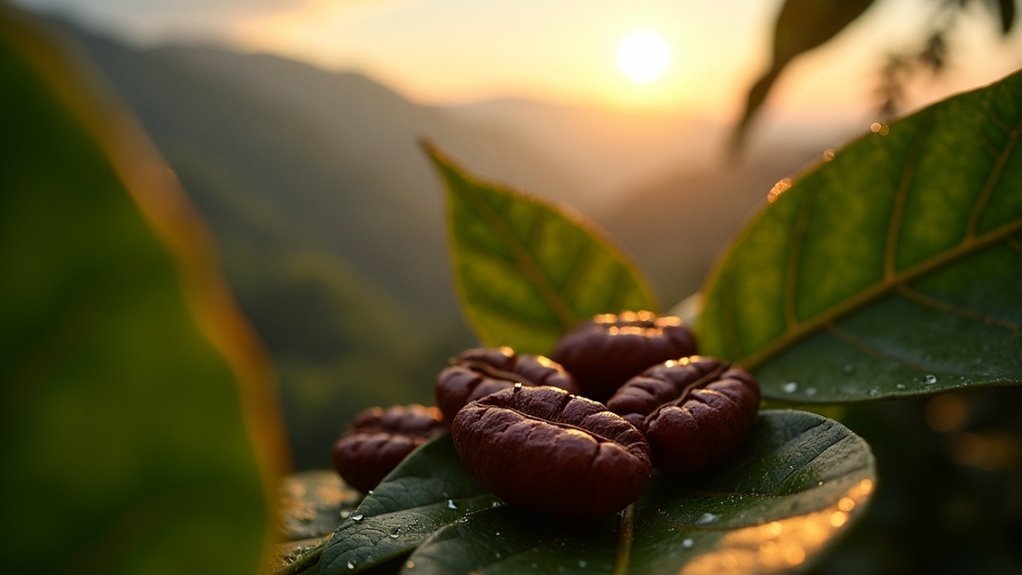Apaneca Ilamatepec coffee is a premium specialty brew from El Salvador, cultivated in the picturesque Apaneca-Ilamatepec mountain range. The region’s rich volcanic soil and elevated altitudes contribute to the vibrant flavors found in its Arabica beans. Noteworthy varietals such as Bourbon and Pacas showcase sweet and intricate flavor profiles. The unique climate and commitment to sustainable farming practices in this region not only enhance the taste but also improve the overall quality of the coffee. Delving into its historical significance and economic impact provides a deeper appreciation for this remarkable brew.
Key Takeaways
- Apaneca Ilamatepec coffee is a specialty brew from El Salvador, cultivated in the Apaneca-Ilamatepec mountain range, renowned for its rich volcanic soil.
- The region’s high altitude and unique microclimate contribute to the coffee’s complex flavors and bright acidity.
- Key Arabica varietals such as Bourbon, Pacas, and Pacamara each provide distinct flavor profiles and tasting notes, including hints of peach and dark chocolate.
- Sustainable farming practices, like shade-grown coffee and meticulous handpicking, enhance the quality of the beans and promote biodiversity.
- Coffee production plays a vital role in El Salvador’s economy, creating jobs and enriching the country’s cultural identity.
Overview of Apaneca Ilamatepec Coffee
Apaneca Ilamatepec coffee is a distinguished choice in the realm of specialty brews, primarily due to its exceptional cultivation environment within the mountainous region of El Salvador.
Situated in the Apaneca-Ilamatepec mountain range, this area features rich volcanic soil and a favorable microclimate, creating optimal conditions for coffee growth. The high altitudes, ranging from 1,300 to 1,600 meters, enhance the beans’ bright acidity and intricate flavors.
Notable varieties such as Pacas, Bourbon, and Pacamara play a significant role in producing the high-quality coffee that constitutes approximately 60-65% of El Salvador’s total coffee output.
This commitment to excellence is a testament to the dedication of over 9,740 families who nurture these exceptional beans.
Unique Characteristics of the Region
In the Apaneca-Ilamatepec region, volcanic soil plays an essential role in cultivating exceptional coffee varieties, enhancing flavor complexity.
The unique microclimate, characterized by stable temperatures and abundant rainfall, supports the growth of high-quality Arabica beans.
Additionally, the region’s rich biodiversity and commitment to sustainable practices create a thriving ecosystem that benefits both coffee growers and the environment, resulting in a superior coffee experience for enthusiasts.
Volcanic Soil Benefits
Rich in organic matter, the volcanic soil of the Apaneca-Ilamatepec region plays an essential role in producing exceptional coffee. This mineral-rich soil not only enhances coffee bean quality but also contributes to vibrant acidity and complex flavor profiles, including notes of fruit and chocolate.
With approximately 90% of El Salvador’s soils being volcanic, the unique characteristics of this mountainous area truly shine through in every cup. The ideal altitude of 1,300 to 1,600 meters, combined with the volcanic soil, fosters microclimates that support the growth of distinctive coffee varieties like Pacas and Pacamara, elevating your coffee experience remarkably.
Enjoy the rich flavors and aromas that only volcanic soil can provide!
Unique Microclimate Conditions
While many regions may boast favorable climates for coffee cultivation, the unique microclimate of the Apaneca-Ilamatepec area sets it apart as a prime location for producing exceptional coffee.
With stable temperatures around 25°C and an average annual rainfall of 1,823 mm, this coffee-growing region creates ideal conditions for optimal bean development. High-altitude farms, ranging from 1,300 to 1,600 meters, enhance flavor complexity, resulting in a rich tasting experience.
Additionally, the volcanic soil enriches the land, supplying essential nutrients that nurture the coffee plants. These distinct climatic features not only improve the overall quality of the beans but also allow for the cultivation of unique coffee varieties, contributing to the region’s prestigious Designation of Origin and making it a sought-after destination for coffee enthusiasts.
Biodiversity and Sustainability Practices
The Apaneca-Ilamatepec region is a remarkable example of how coffee cultivation can align with biodiversity and sustainability practices, enhancing both the environment and the quality of coffee produced.
- The volcanic soil, rich in organic matter, fosters diverse ecosystems that benefit coffee plants.
- Shade-grown coffee farms create habitats for a variety of plant and animal species, promoting ecological balance.
- Sustainable farming methods protect natural forests while ensuring the production of high-quality coffee.
- Over 9,740 families in the region cultivate unique coffee varieties, such as Pacas and Pacamara, in a stable microclimate that supports their growth.
These sustainable practices not only uplift local communities but also demonstrate that coffee cultivation can coexist harmoniously with nature, showcasing a model for environmentally responsible coffee production.
Coffee Varieties Grown in Apaneca-Ilamatepec
In the Apaneca-Ilamatepec region, you’ll discover a rich variety of coffee that enhances flavor profiles and exemplifies sustainable farming practices.
Varietals such as Pacas, Bourbon, and Pacamara flourish in the region’s unique conditions, each bringing its own distinct characteristics to the coffee’s taste.
Key Coffee Varietals
The Apaneca-Ilamatepec region is renowned for its exceptional coffee varietals, cultivated under optimal conditions that enhance their distinct characteristics.
Here, coffee enthusiasts can explore a diverse selection of Arabica varieties, including:
- Bourbon coffee: Known for its harmonious sweetness and velvety body.
- Pacas: A Bourbon mutation, prized for its disease resistance and distinctive flavor profile.
- Pacamara: A hybrid that produces large beans with intricate flavor notes.
- Catimor: Valued for its adaptability and unique taste.
These varietals play a significant role in establishing the area’s reputation for high-quality coffee, making Apaneca-Ilamatepec an essential destination for coffee lovers.
Flavor Profiles
How do the unique growing conditions of the Apaneca-Ilamatepec region influence the flavor profiles of its coffee varieties? The region’s rich volcanic soil and diverse microclimates create an ideal environment for coffee cultivation, resulting in exceptional flavor complexity. You’ll discover coffees with vibrant fruity and floral notes, including hints of peach, dark chocolate, and toasted nuts. Below is a glimpse of some popular varieties:
| Variety | Flavor Notes | Characteristics |
|---|---|---|
| Pacas | Rich, sweet | Disease-resistant, smooth |
| Bourbon | Floral, fruity | Classic, well-balanced |
| Pacamara | Bold, complex | Unique hybrid, high quality |
These flavor profiles truly highlight the coffee excellence of the Apaneca-Ilamatepec region.
Sustainable Farming Practices
While exploring the sustainable farming practices in the Apaneca-Ilamatepec region, you’ll discover how these methods significantly influence the cultivation of its esteemed Arabica coffee varieties, including Pacas, Bourbon, Pacamara, and Catuaí.
- Coffee grown under shade promotes biodiversity, creating a harmonious ecosystem.
- The region’s volcanic soils, rich in organic matter, enhance the quality of the beans.
- Handpicked beans ensure careful selection, which elevates flavor profiles.
- Eco-friendly washing and sun-drying processes intensify the coffee’s taste.
These sustainable farming practices are vital for soil conservation and the long-term success of coffee cultivation, positively impacting over 9,740 families who depend on this unique and rich agricultural heritage.
Farming Practices and Sustainability
Sustainable coffee farming practices in the Apaneca-Ilamatepec region reflect a deep commitment to environmental stewardship and biodiversity.
Farmers prioritize eco-friendly methods, using shade-grown techniques that support the growth of 100% Arabica species like Pacas under native trees. This approach not only enhances soil conservation but also benefits the ecosystem.
The region’s volcanic soil, rich in organic matter, fosters robust coffee growth and encourages sustainable agricultural practices.
Flavor Profile and Tasting Notes
The commitment to eco-friendly farming practices in the Apaneca-Ilamatepec region significantly shapes the flavor profile of its coffee.
Each sip offers a delightful medley of fruity and floral notes, ensuring a memorable tasting experience.
- Tasting notes include ripe peach and dark chocolate
- Exhibits a smooth, tea-like quality when brewed using an Aeropress
- Offers sweet, chocolatey flavors with subtle hints of toasted almonds in espresso
- Features a balanced sweetness and clean acidity across various brewing methods
These elements harmoniously combine to create a complex flavor profile, highlighting the distinctive characteristics of Apaneca-Ilamatepec coffee that you’re sure to enjoy.
Historical Significance of Coffee in El Salvador
Coffee holds a pivotal role in El Salvador’s history, shaping both its economy and culture since cultivation began between 1800 and 1815. The coffee industry became a cornerstone of the nation, particularly during the Coffee Revolution of the late 19th century, when it emerged as the dominant export.
This surge transformed social structures and economic landscapes across key coffee-growing regions. By 1970, coffee accounted for an impressive 50% of the country’s GDP.
However, the civil war from 1979 to 1992 disrupted this growth, leaving lasting challenges within the industry and altering the historical trajectory of El Salvador’s agricultural practices.
Today, coffee continues to be a significant part of El Salvador’s identity, influencing various aspects of daily life and cultural heritage.
Economic Impact of Coffee Production
While many might assume that coffee’s primary role is merely as a beverage, its production in El Salvador, particularly in the Apaneca-Ilamatepec region, drives substantial economic activity.
The economic impact of coffee extends well beyond just enjoying a cup:
- It provides approximately 25,000 direct jobs, which are vital for sustaining families in rural communities.
- The region contributes to the production of around 561,000 bags of coffee for the 2024/2025 marketing year.
- Coffee exports represent a significant portion of the country’s economy, with key markets in the U.S. and Belgium.
- The challenges posed by fragmented ownership among coffee producers can affect overall production efficiency.
These elements underscore the critical role of high-quality coffee in one of El Salvador’s most important coffee-producing areas.
How to Brew Apaneca Ilamatepec Coffee
Ever wondered how to unlock the full potential of Apaneca Ilamatepec coffee?
Begin with freshly ground Pacas coffee beans to enhance its fruity and floral flavor profile. For optimal extraction, brew with water heated to 90-96°C (194-205°F) and use a coffee-to-water ratio of 1:15.
Experiment with brewing methods like Aeropress or pour-over to showcase the unique notes of peach and dark chocolate. Always use filtered water to maintain purity and avoid any unwanted flavors.
Pay attention to brewing time; a steep of 2-4 minutes for Aeropress preserves those delicate characteristics, ensuring a delightful cup.








